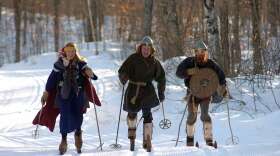A new report from UW-Milwaukee examines how comfortable older LGBT people feel about aging in the Milwaukee area.
Researcher and social work assistant professor Mark Williams collected the comments of 255 LGBT residents, between the ages of 50 and 89.
His study reveals areas respondents say need extensive improvement, such as housing.
Williams says a significant number of respondents believe they’ll eventually live in an assisted living facility or nursing home. Yet he says most fear they won’t feel safe or comfortable in such a setting.
“Which raises a question about do they know where to go to find a place that will respect them, that will care for them, (where) they’ll be able to be open about who they are. Or are they going to encounter what we hear from a lot of older adults, that they feel like they have to go back into the closet as a result of becoming more dependent, needing to be institutionalized or in a facility where they’re dependent on the care of others, who may not treat them with dignity if they know about their LGBT status,” Williams says.
Williams says the internal struggle can cause stress, putting a senior’s health at risk.
Karen Gotzler heads the Milwaukee LGBT Community Center. She says the survey’s findings on housing fears don’t surprise her. She’s heard such talk, among fellow LGBT people who are 50 and older. But Gotzler says now that advocates see the results in black and white, she hopes they take action.
“It’s clear that that’s a big area we’re going to have to focus on as a community, so that there are more places where older adults can feel comfortable being themselves,” Gotzler says.
Gotzler says the community could build housing designed to be welcoming to LGBT seniors, or the community could invest in training for all caregivers.
Gotzler admits future generations might not need the same supports.
“In large part, part of the reason we’re in this situation is that so many people in the older generation were disowned by families or were abused by their families, so they’ve created a family for themselves. And as their created family -- their family of choice -- as those individuals pass on or are too old, they really do come to be much more alone in the world,” Gotzler says.
Gotzler says attitudes about LGBT people continue to evolve. She says by the time younger people get older, more may have support from their families and the community, at-large.
In addition to housing, the UW-Milwaukee survey asked residents to weigh in on a number of other measures related to their experience of aging in Milwaukee. Among the findings:
Milwaukee's LGBT friendliness: 83 percent said the city was somewhat or very LGBT friendly
Friendliness of services: 44 percent said local services were LGBT friendly
Legal: 50 percent anticipate needing legal services to understand and navigate the implications of recent changes in marriage, divorce and estate planning
Health: 43 percent are receiving help for a health issue
Caregiving: More than 25 percent are providing caregiving support for another person
The survey is among the first conducted in Wisconsin on the subject of the aging LGBT population. Researcher Williams believes the study will encourage greater competency and research, and raise more awareness about the LGBT community.
"This survey reminds me that we have areas to work on and we have lessons to learn from LGBT older adults, about how it is you survive in sometimes unfriendly environments that they've experienced over the course of their life," Williams says.
The study from the Helen Bader School of Social Welfare at UWM was conducted in cooperation with Milwaukee's LGBT Community Center's SAGE program, the local chapter of the national organization that addresses aging issues of the LGBT community.







